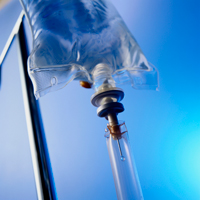Hodgkin Lymphoma: Chemotherapy
Hodgkin Lymphoma: Chemotherapy
What is chemotherapy?
Chemotherapy, or chemo, is a treatment for cancer that uses medicines. These medicines work by destroying fast-growing cells in the body, such as cancer cells. Chemotherapy is an important part of treatment for most people with Hodgkin lymphoma, also called Hodgkin disease. For this treatment, you will see a medical oncologist. This is a doctor who specializes in using medicines to treat cancer.

How is chemotherapy given for Hodgkin lymphoma?
Chemotherapy medicine is most often given by IV (intravenously) through a vein. It may also be taken by mouth as a pill, or as an injection. The treatment may be done as an outpatient visit to a hospital. This means you go home the same day. Or it may be at your doctor’s office, a chemotherapy clinic, or at home. In some cases, you may stay in the hospital during treatment.
You get chemotherapy in cycles over a period of time. That means you take the medicine for a set amount of time. Then you have a rest period. Each period of treatment and rest is one cycle. You may have several cycles. Having treatment in cycles helps by:
-
Killing more cancer cells. Chemotherapy generally kills cancer cells while they are actively growing and dividing. Cancer cells are not dividing all the time. So having more than one cycle of chemotherapy gives the treatment more chances to kill the cancer cells.
-
Giving your body a rest. Treatment is hard on other cells of the body that divide quickly. This includes cells in the lining of the mouth and stomach. This causes side effects, such as mouth sores and an upset stomach (nausea). Between cycles, your body can get a rest from the chemotherapy.
-
Giving your mind a rest. Having chemotherapy can be stressful. Taking breaks between cycles can let you get an emotional break between treatments.
What are common medicine combinations used to treat Hodgkin lymphoma?
For Hodgkin lymphoma, your doctor is likely to give you more than one medicine. This is called combination chemotherapy. Many different medicines are used in chemotherapy to treat Hodgkin lymphoma. The combinations are usually referred to by acronyms created by using the first letter of each of the medicines used. The most common medicine combination to treat Hodgkin disease is ABVD. ABVD stands for:
-
A - Adriamycin (doxorubicin)
-
B - Blenoxane (bleomycin)
-
V - Velban, Velsar (vinblastine)
-
D - DTIC-Dome (dacarbazine)
Another medicine combination that is used is called BEACOPP. BEACOPP stands for:
-
B - Bleomycin
-
E - Etoposide
-
A - Adriamycin (doxorubicin)
-
C - Cyclophosphamide
-
O - Oncovin, Vincasar PFS (vincristine)
-
P - Procarbazine
-
P - Prednisone
A combination of chemotherapy medicines that is often given with radiation therapy is called Stanford V. It includes these medicines:
-
Doxorubicin (Adriamycin)
-
Mechlorethamine (nitrogen mustard)
-
Vincristine
-
Vinblastine
-
Bleomycin
-
Etoposide
-
Prednisone
What are common side effects of chemotherapy?
Chemotherapy medicines are designed to attack and kill cells that divide quickly, including lymphoma cells. These medicines can also affect quickly dividing normal cells. These include hair, and bone marrow cells where new blood cells are made. The side effects of chemotherapy are different for everyone. They depend on:
-
The type of medicines you're taking
-
How often you take them
-
How long your treatment lasts
-
Your age, health, and other factors
Your medical oncologist and chemotherapy nurse will talk with you about possible side effects with your treatment. Some typical side effects for the most common chemotherapy medicines for Hodgkin lymphoma include:
-
Loss of appetite
-
Bruising or bleeding, due to a lack of blood cells (platelets) that cause clotting
-
Hair loss
-
Infection, from lower white blood cell counts
-
Mouth sores
-
Nausea and vomiting
-
Loose stool, or diarrhea
-
Tiredness, from a lack of red blood cells (anemia)
Some medicines can help reduce these side effects and help you recover from chemotherapy more quickly. Most of these side effects go away when treatment ends.
Before treatment, your doctor may test how well your heart and lungs are working. Some chemo medicines may affect these organs, so your doctor will watch them closely. Tell your doctor about any new symptoms, especially:
-
Shortness of breath with exercise or when lying down
-
Chest pains
-
Coughing
-
Swollen legs
Some chemotherapy medicines may raise your risk for getting another type of cancer later on. Another side effect is a risk of not being able to have a biological child, or infertility. If this is a concern for you, talk with your doctor about your options before you start treatment.
Working with your healthcare provider
It's important to know which medicines you're taking. Write your medicines down. Ask your healthcare team how they work, and what side effects they might have. Keep a written diary of your treatment schedule and any signs or symptoms you have. Talk with your healthcare providers about what signs to look for, and when to call them. Chemotherapy can make you more likely to get infections.
It may also be helpful to keep a diary of your side effects. Write down physical, thinking, and emotional changes. A written list will make it easier for you to remember your questions when you go to your appointments. It will also make it easier for you to work with your medical team to make a plan to manage your side effects.
Updated:
March 16, 2019
Sources:
NCCN Clinical Practice Guidelines in Oncology - Hodgkin Lymphoma Version 1.2017, National Comprehensive Cancer Network
Reviewed By:
LoCicero, Richard, MD,Watson, L Renee, MSN, RN